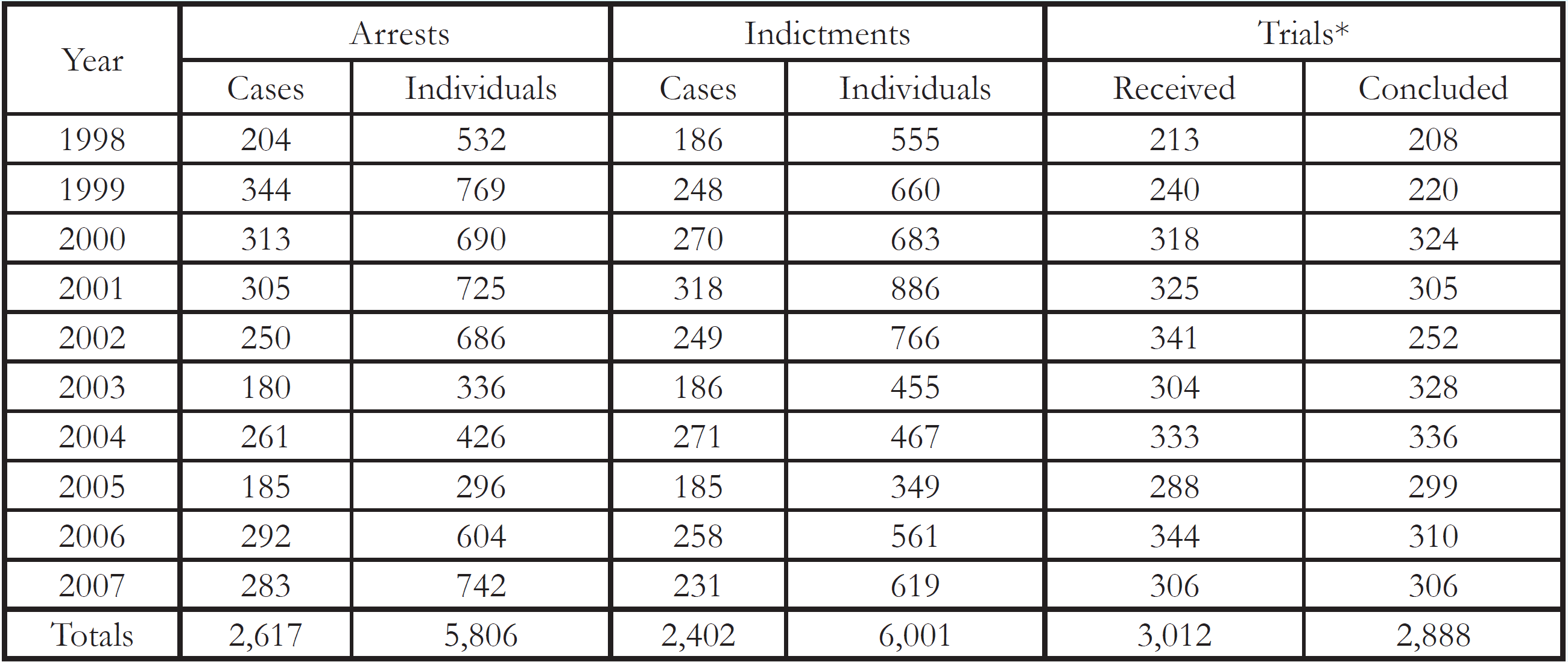Annual statistics released by the Chinese government show that arrests and trials for endangering state security (ESS) are again on the rise, approaching their highest levels for the past decade. The data from the China Law Yearbook, which has been compiled into the accompanying table, offer a rare look into the way that Chinese law enforcement agencies handle this category of crime—which includes subversion, separatism, espionage, and trafficking in state secrets, among other political crimes.
One of the first things to note is that though their numbers are increasing in absolute terms, ESS cases are still relatively rare in China. On average, roughly one of every 2,000 cases approved for arrest by Chinese procuratorates and one individual out of more than 1,400 indicted will face ESS charges. State security trials accounted for only 0.04 percent of all first-instance criminal trials heard by Chinese courts in 2007.
There are several possible reasons why the numbers for arrests, indictments, and trials do not match up better. On the one hand, the legal process does filter out a certain number of questionable cases and, perhaps, shifts responsibility for punishment to administrative measures such as “reeducation-through-labor.” Moreover, there is a well-noted tendency for the criminal justice system to become backlogged with complex or sensitive cases, as many ESS cases are. Thus, it is quite rare for arrest, indictment, and trial to each occur in the same year.
Another point worth noting is that, on average, ESS cases involve more defendants than do criminal cases taken as a whole. More cases alleging large conspiracies, such as those involving espionage rings, underground political parties, or groups advocating independence or greater autonomy for ethnic minorities, tend to drive up the defendant-to-case ratio more than would cases alleging incitement, which tend to involve only one or two individuals.
The proportion of ESS cases is expected to increase significantly in 2008, however, thanks in large part to crackdowns during the year in the Xinjiang Uyghur Autonomous Region and Tibet. During a December 2008 news conference, Xinjiang procuratorial officials acting with unusual transparency revealed that 1,295 arrests and 1,154 prosecutions were made there for ESS in the first 11 months of 2008. These figures are astonishing because, as the table below shows, they correspond to approximately 20 percent of the total number of arrests and indictments made nationally over the entire previous decade.
According to statistics published in the Xinjiang Yearbook for the years 1996 through 2003, approximately one half of all ESS trials in China take place in Xinjiang. The number of defendants in ESS cases tried in Xinjiang is typically more than in other parts of China, making it difficult to estimate national totals from the 2008 statistics released for Xinjiang. But, with the large number of arrests and indictments following unrest in Tibet, along with the crackdown against dissent in other parts of China, it is likely that for the country as a whole the number of ESS arrests and indictments in 2008 could each well exceed 2,000.
The big increase in arrests and prosecutions for ESS last year is reflected in an unprecedented rise of known and suspected cases of individuals imprisoned for endangering state security in Dui Hua’s prisoner database. During 2008, the number of such prisoners in the database more than doubled—going from 355 on December 31, 2007, to 763 on December 31, 2008, largely attributable to arrests of Tibetans following the protests in March.

